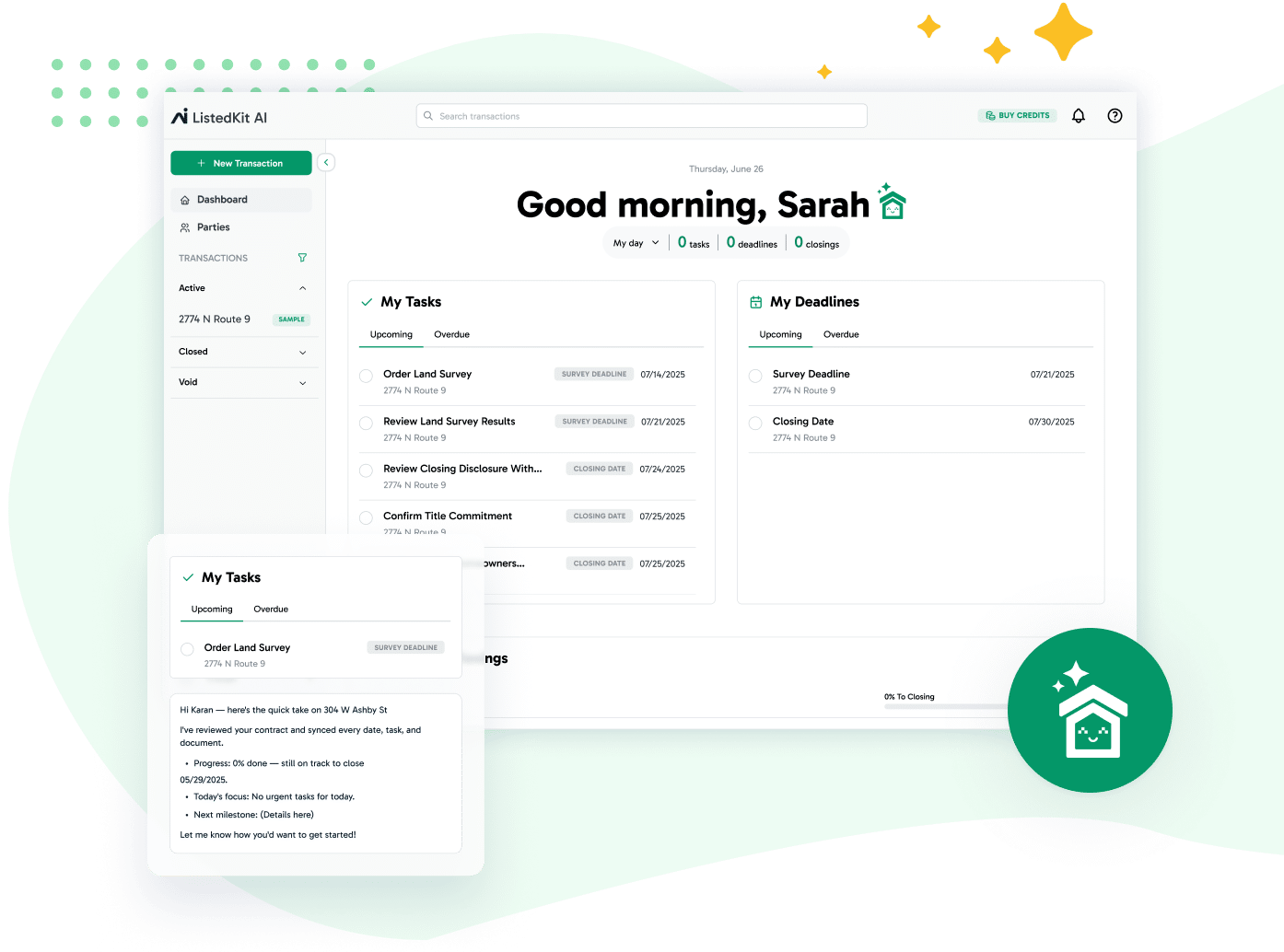The number of “training resources” floating around online for transaction coordinators can feel like a mixed bag. Some are outdated, others skim the surface, and many were never built with real-life coordination work in mind.
As a TC, the last thing you want is to waste time sorting through generic advice or watching another 90-minute video that could’ve been a checklist.
This guide is about practical resources that actually help—the kind that give you smarter systems, tighter processes, and sharper decision-making.
1. ListedKit Webinars – Real-World Lessons for Real Estate Workflows
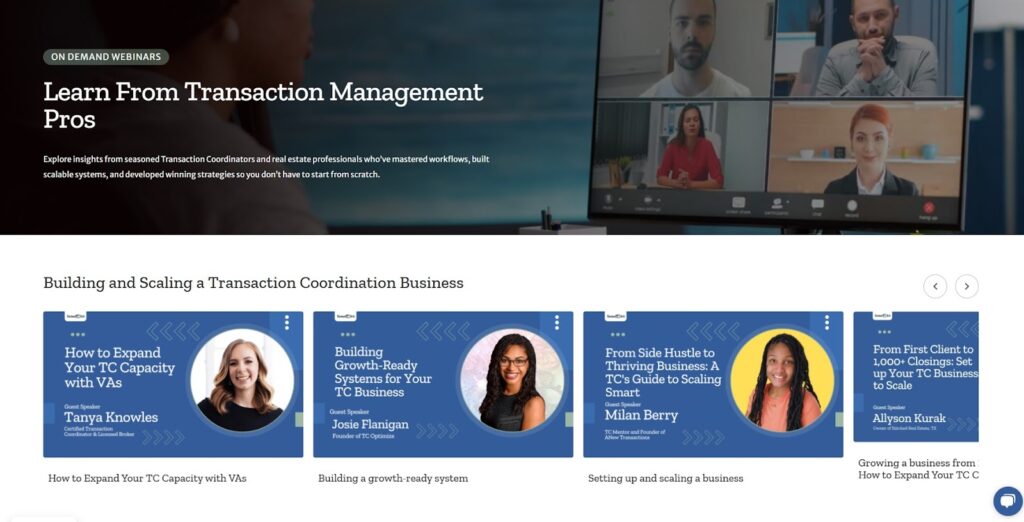
If you’re looking for training resources that offer practical insight—not theory—ListedKit’s webinar series is the best place to begin.
These sessions are built specifically for real estate transaction coordinators. They cover actual systems, time-saving strategies, and lessons learned from TCs who’ve grown their businesses from one file to full teams.
What makes these webinars different is their focus and structure. They’re broken into three main tracks, so you can pick what fits your next step:
Building and Scaling a Transaction Coordination Business
Perfect for those starting out or looking to grow, this webinar will feature guest experts like Tanya Knowles, Milan Berry, and Allyson Kurak—TCs and business owners who share how they expanded capacity, added virtual assistants, and built a real estate business that can handle huge volumes without burning out.
Productivity and Workflow Optimization
This track covers automation, batching, and process management.
For example, Lisa Vo discusses the dos and don’ts of automation, while Kristi Winfree shares how task batching helps cut distractions. These are ideal if you want to gain back time and sharpen your internal systems.
Professional Growth and Industry Relationships
These sessions focus on real estate client communication, shifting market needs, and long-term career planning. You’ll find tips from pros like Brittany Kramme and Melissa Kiser on managing relationships with buyers and sellers while adapting your skills for growth.
Every webinar is led by real estate professionals who understand your role and workload. And because they’re recorded, you can learn at your own pace—and apply lessons directly by signing up for ListedKit’s free trial.
2. Online Learning Platforms like Udemy and Coursera
Suppose you’re looking for flexible ways to sharpen your skills or get started with real estate transaction coordination. In that case, online courses from platforms like Udemy and Coursera offer a solid path forward.
These lectures are designed to explain what a transaction coordinator does in the real estate business, from day-to-day task management to long-term career growth.
Take, for example, “How to Become a Real Estate Transaction Coordinator” on Udemy. It covers:
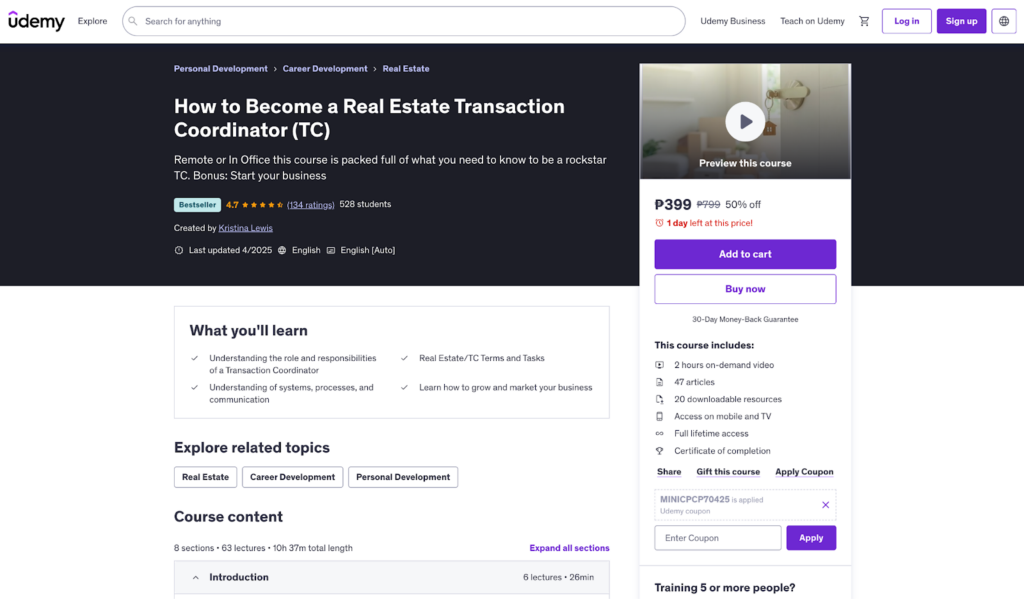
- Real estate terminology and key responsibilities
- Contract timelines and file organization
- The role of communication in preventing delays
- Tips for marketing your services if you’re launching a TC business
This course includes short videos, downloadable tools, and over 40 written resources. It’s great for anyone getting started or ready to formalize what they already do across real estate transactions.
Coursera also offers a solid option for foundational business skills through its “Manage a Real Estate Business” course. While it’s aimed at agents, much of the content applies to TCs, especially those running businesses or supporting real estate teams.
You’ll find useful material on:
- Real estate law and how it impacts day-to-day operations
- Building reliable administrative systems
- Managing finances and vendors
- Goal-setting and career development
This course encourages you to think like a business owner and strengthen your systems in support or lead roles.
3. Facebook Groups (Private and Public)
Facebook might not seem like a go-to place for professional learning. Still, it’s become one of the most active spaces where real estate professionals—especially transaction coordinators—share real advice, tools, and support.
These groups often act as peer-run help desks, open forums for process improvement, and safe spaces to discuss client scenarios that don’t show up in formal training.
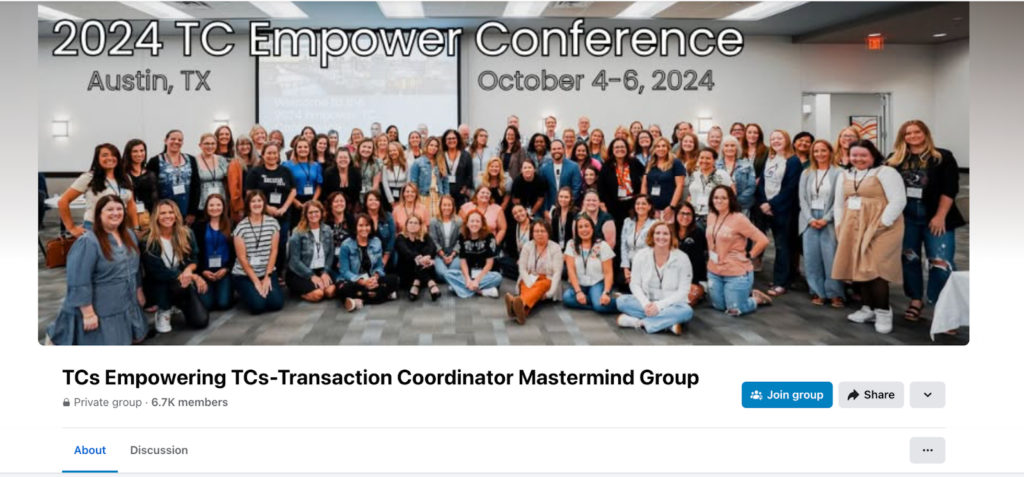
Here are two standout communities you should check:
- Transaction Coordinator Mastermind Group. A private group built for TCs, aspiring TCs, and admins. The focus is on thoughtful conversation, resource sharing, and growth. The vibe is solution-oriented. Members must keep discussions respectful, helpful, and specific to real-life workflows—not venting or self-promotion. Think of it as a roundtable for experienced voices and rising coordinators alike.
- Transaction Coordinators and Admins for Real Estate. This public group is run by experienced TC business owners who actively share what’s working in their real estate coordination process. It’s approachable, full of practical posts, and a great starting point if you’re newer or still shaping your systems. Questions around templates, timelines, and client communication are common—and often answered in detail.
How to get the most from these groups
- Search before you post. Before starting a new thread, use the search function to look up keywords like “inspection delay,” “calendar system,” or “earnest money reminders.” You’ll often find multiple threads with screenshots, templates, and real experiences.
- Avoid state-specific confusion. Always clarify your market and ask for regionally accurate input. For example, disclosure timelines or earnest money procedures can differ widely between California and North Carolina. Even well-meaning advice can lead you in the wrong direction without clear context.
- Give back. These groups work best when members participate, not just observe. If you’ve tested a tool, cleaned up a messy timeline, or crafted a script that saved you time—share it. Others will appreciate it, and you’ll often get helpful feedback.
- Stay within group guidelines. Most of these communities have clear rules: no pitching, no affiliate links, and no unsolicited messages. The focus is on shared growth and support—not selling. Respect that, and you’ll build stronger peer relationships.
- Use the groups as a sounding board—not a final answer. These are great places to explore different approaches, but when it comes to compliance or legal questions, always confirm details with your broker or refer to local real estate law.
If you’re handling files solo or running a real estate transaction coordination service, these groups can expand your toolset overnight. They’re informal—but the learning is real.
4. State-Specific Certification and Association Courses
Even with great general training, every real estate transaction coordinator eventually needs state-specific knowledge, especially if handling deals in multiple states.
Every state has different compliance requirements, disclosure timelines, and even form layouts. Knowing how your region handles legal documents and communication responsibilities is essential—especially if you hope to work with real estate brokers or expand into contract prep support.
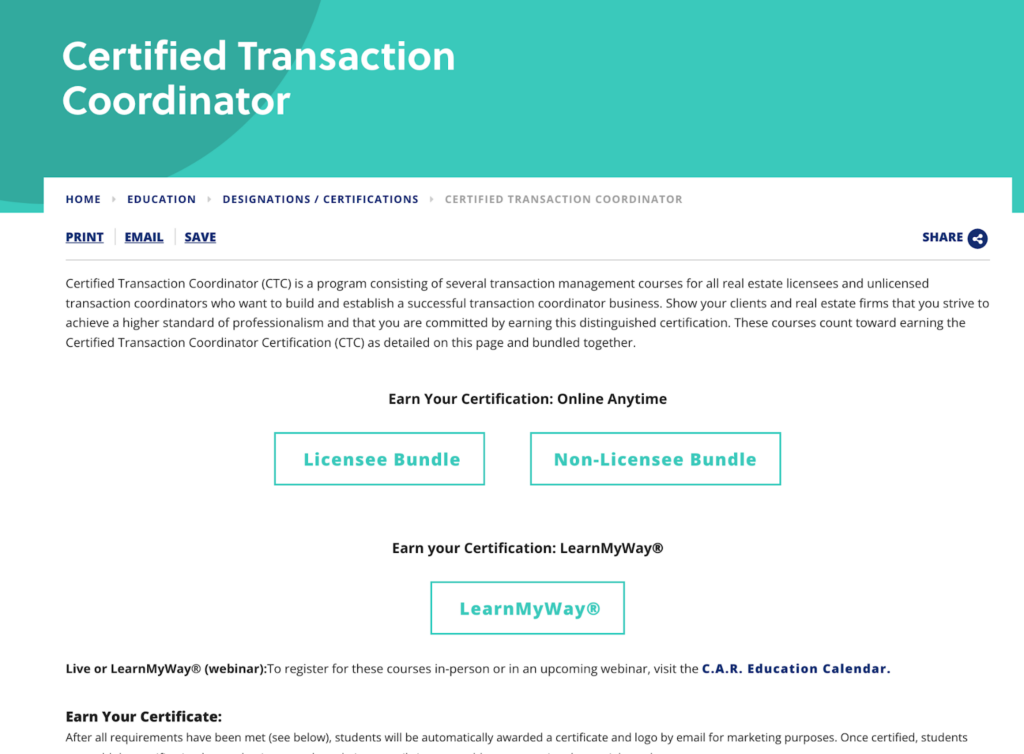
Most state associations offer low-cost or free courses that cover topics like:
- Disclosure timelines and who is responsible for each stage
- Contractual obligations unique to the state (e.g., flood zone disclosures, radon testing rules)
- How to avoid common legal issues in communication and documentation
Examples worth checking out:
- California Association of Realtors (C.A.R.). Offers webinars, blogs, videos, thought leadership content, and more on best practices, legal matters, and market updates that you, as a TC, should know and understand for your clients.
- Florida Realtors. Has rotating live sessions with downloadable materials.
Even if you’re already licensed or managing a full slate of contracts, these training resources can be a useful touchpoint for refining your understanding of real estate law and building better systems around compliance.
Some courses meet a license renewal requirement, which is valuable if you hold an active real estate license or plan to get one.
5. Free Templates, Checklists, and Email Scripts Worth Using
Not all training comes from courses or webinars. For many real estate transaction coordinators, templates, checklists, and email scripts act as hands-on training tools. They help you learn process flow, sharpen communication, and build repeatable systems—just by using them.
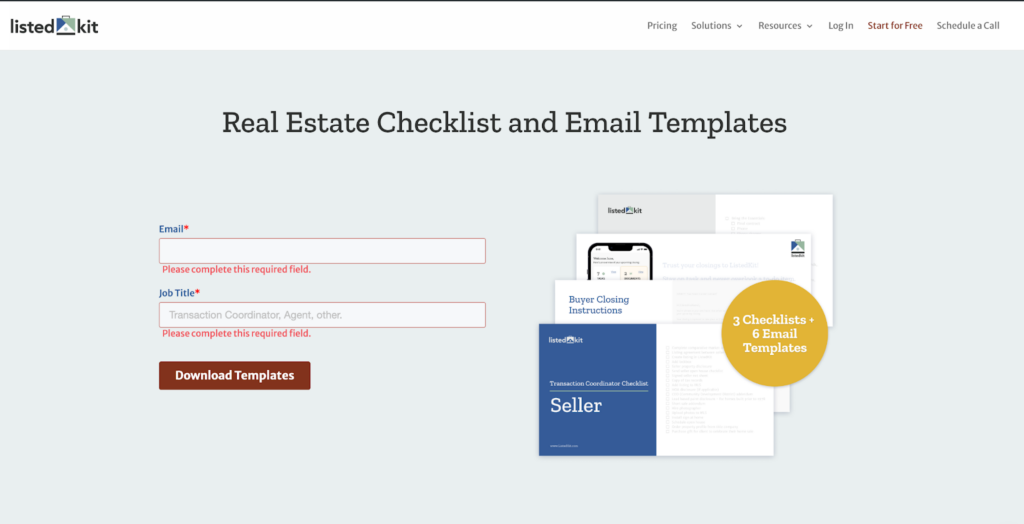
If you’re figuring out how to manage timelines, follow up with real estate clients, or stay organized across multiple deals, the right template can teach you what to do, when to do it, and how to do it well. These aren’t just downloads—they’re working references that guide decision-making and keep you consistent.
That’s what makes them valuable training resources, especially if you’re learning through real transactions or building your business while handling active files.
Here’s what makes a resource worth using:
- The editable format that adapts to your file flow (Google Sheets or ClickUp often work well)
- Clear stages are broken down by essential tasks, not just general ideas
- Pre-written scripts for client updates, inspection follow-ups, and closing confirmations
- Labeling by transaction type (listing, buyer, dual agency, etc.)
You can take what normally lives in a folder on your desktop and move it into a repeatable system that sends alerts, tracks deadlines, and improves the overall client experience.
Other Solid Sources to Look Out For
- Shared folders from professional groups (often posted by skilled transaction coordinators)
- Blog posts by active TCs who share what works for them—just make sure they’re updated in the past 12 months
- Google Drive checklists that real estate teams use internally and are willing to share with peers
When used with a platform like ListedKit, these templates reduce administrative tasks and help you provide efficient transactions that support clients and agents without double-checking every reminder or doc request.
Get Ready to Train Smarter
The best training resources don’t add to your workload—they make it easier to build smarter systems. Whether it’s a state-approved course or a peer’s shared checklist, each of our five options helps you sharpen your process and gain more control over your time.
Here’s a quick recap of where to start:
- ListedKit Webinars. Real-world strategies from experienced TCs
- Udemy and Coursera. On-demand lessons for foundational and business skills
- Facebook Groups. Practical advice, tools, and peer support in real-time
- State-Specific Courses. Compliance-focused training based on your market
- Templates and Scripts. Ready-to-use systems that keep you organized and efficient
If you’re still sending manual reminders, organizing files by email thread, or struggling to track agent updates, applying what you’ve learned with a digital tool that matches your pace might be time.
Book a free call with our team to see how you can turn your training into real process improvements. You’ve got the knowledge—now build the system that supports it with ListedKit.


